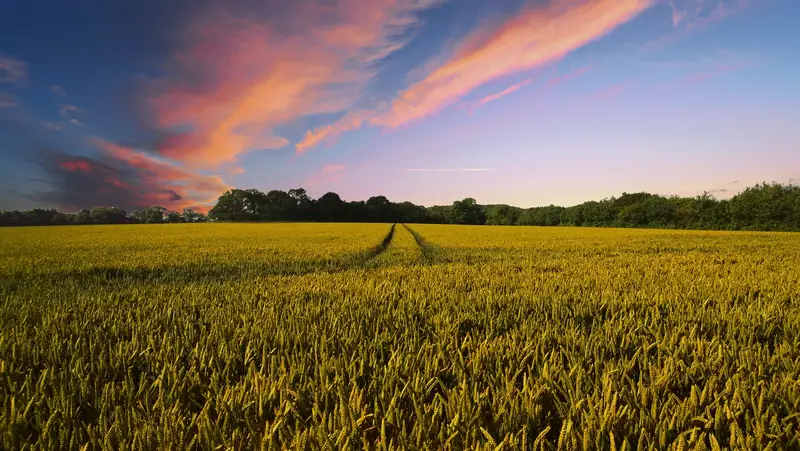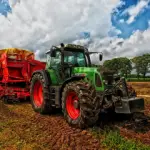
Having been involved with buying three farms in the last 18 months, I feel I know a enough about farms and farm land to understand some of the pitfalls of buying rural farmland.
What do I need to know before buying rural land?
To avoid the pitfalls of buying rural land and what you need to know includes to make sure the land is in good condition with good drainage, to make sure the boundaries are clear and these match the legal title plans and that you have access to the farmland to a public highway for vehicles.
Please also read this article to discover how you could save £71,475 on your next property mortgage if you sell your house and rent before buying again. Even I was amazed when I did the calculations! The strategies you learn in this article will not only save you money, but it will also reduce the stress of buying your next house.
1. Check the ground conditions of rural land
Before you buy any farmland check the condition of the soil and the drainage, as some farmland is not good for growing crops, nor is it any good for keeping livestock. Ask an expert farm specialist surveyor to survey the land before you buy the land.
2. Confirm the boundaries of the land
As with buying any plot of land, you need to check and confirm the boundaries of the land you are buying. This is about checking that the rural land you can see you are buying matches with the legal title plans held by Land Registry.
3. Ownership of boundaries surrounding the farmland
The cost of maintaining boundaries on farmland can be high, especially if you buy a large amount of land, which is why it’s important you confirm which boundaries will be your responsibility to maintain.
4. Are the fences or hedges in good order?
Depending on what the farmland is going to be used for will depend on how necessary good fencing is, for example, if the land is for grazing livestock good fences will be a requirement to keep the animals contained.
5. Registered or unregistered title of the farmland
Often times farmland has remained in the ownership of farming families for a long time and has not yet been registered with Land Registry.
Unregistered land isn’t a problem when buying the farmland, but it can take longer for the conveyancing process, and your solicitor will need to carry out a more detailed checks into the land and check any covenants or restrictions that may or may not exist.
Ideally, Land Registry will want a copy of the original title deeds to register the land, but if these are not available, then an insurance policy to cover any risk of a defective title can be taken out.
6. Access to the farmland
Farmland without access is next to useless and will be almost worthless, which is why it’s important to confirm the farmland you’re buying has access to a public highway. It is very important that the access allows vehicles to pass over it so that farming epiupment and vehicles have access to the land.
7. Planning use for farming use or otherwise
You need to make sure the farmland you intend to buy has the correct planning use in place for its intended use, be it for continued use a farmland or if you intend to change use to something else, like property development.
8. Overage on land designated as potential development land
Some land will have and overage clause (also known as a clawback clause) for the owner, or a previous owner, to clawback profit from an increase in value should planning permission be given for change of use to develop the land instead of keeping it as farmland.
9. Farm buildings use and occupation
Check whether the farmland has buildings and/or farmhouses on the land and whether any of these are currently occupied. If any have farming tenancies, and if they have farming tenants living in them, they have good security of tenure to stay.
10. Farming entitlements and subsidies
The current rules around farming entitlements and subsidies mean that the farmland needs to be farmed to obtain the entitlements. It is the owner of the land who will get the entitlements, which should be transferred with ownership, but often times the are paid for.
11. Public rights of way and public footpaths
Having recently had problems with a public right of way with local residents, this is something to be aware of. We were trying to move the foot path from going straight through the farmyard, which made the path better and this avoided any dangers associate with walking next to heavy plant and machinery.
But certain locals created havoc over the panned move for no good reason, and this took longer than planned and more costs to make the change. Never under estimate how locals don’t like change.
Is rural property a good investment?
Rural property is a good long term investment and in time will increase in value like and land or property does. But investing in rural land becomes an even better investment if you obtain planning permission to change the land into development land.
What to ask when buying acres?
When buying farmland by the acre, and on the basis you intend to use the land for farming, you need to ask about the quality of the land. Ask about what has been farmed on the land in the past few years, as this will affect what the land is used for going forward.
Does rural land appreciate?
As with all land and property rural land will appreciate in value over time, as there is only a finite amount of land, and more and more farmland is being built on for housing. Farmland is valued on a per acre basis and will be worth more and appreciate better if it’s quality farmland.
Please don’t forget to read this before you leave…
Please don’t forget to also read this article to discover how you could save £71,475 on your next mortgage if you sell your house and rent before buying again. As I said earlier, even I was amazed when I did the calculations! Learn about how you will reduce the stress of moving house, whilst at the same time potentially save thousands in the process!
I hope you’ve enjoyed this article about the pitfalls of buying rural land
If you’ve enjoyed this article about “the pitfalls of buying rural land” please share it on your favourite social media site.
Also, if you have any questions, please feel free to comment below too. Please also share any of your experiences with properties you’ve bought. Alternatively, if you need more help, please feel free to contact us on our contact us page here. Or join the discussion and ask your question in the property forum.




